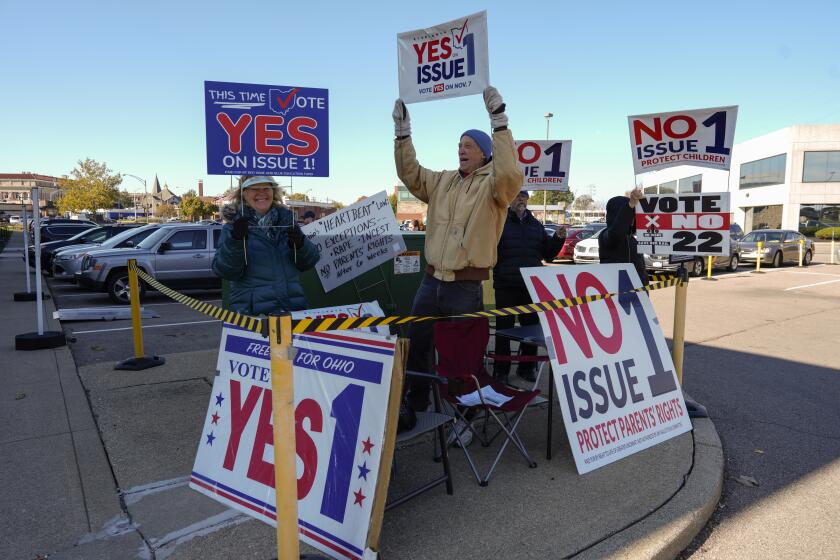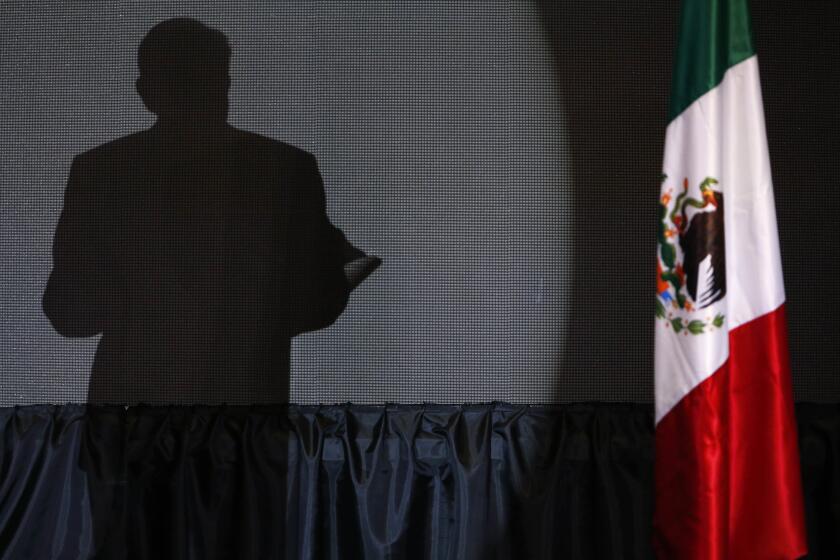A Budget With Bold on Hold
Pinned between the cost of the Iraq war and the size of the federal deficit, President Bush is preparing an austere budget for next year that avoids bold plans like his moribund Social Security overhaul and has little room for even modest spending initiatives. Instead, the budget will make its mark by trying to hold nondefense spending at or below current levels.
But the Republican-controlled Congress has already rejected many of the kinds of fiscal restraints Bush is expected to propose, raising the prospect of a year of trench warfare -- a protracted struggle between the White House and Capitol Hill over relatively small budgetary gains and losses.
In particular, the president will ask Congress to trim the growth of federal benefit programs. When Bush proposed many of the same targets in this year’s budget, however, including agricultural subsidies and Medicaid payments, Congress omitted them from the package of spending cuts that still awaits final action in the House.
And both the deficit problem and the difficulty of forging agreement on budget curbs are likely to worsen this year.
Even if no new spending pressures develop, the White House is expected to ask Congress for three major appropriations bills supplementing regular budget requests: for the continued fighting in Iraq and Afghanistan, for Washington’s share of Hurricane Katrina recovery, and for Bush’s plans to confront the threat of an avian flu pandemic.
The few spending increases Bush is expected to endorse -- such as more support for science and technology education -- will be relatively modest.
What Bush does not plan to pull back on is his demand for continuing tax cuts. He will renew his call for making permanent the reductions enacted in 2001 and 2003 that are to expire in coming years.
“To keep our economy growing and our small-business sector strong,” Bush said in his Saturday radio address to the nation, “we need to ensure that you keep more of what you earn -- so Congress needs to make the tax cuts permanent.”
However, the president’s critics blame the tax cuts for the fact that record budget surpluses before he entered the White House have given way to record deficits.
Second-term presidents often face constraints on spending and policy initiatives; political capital tends to erode over time, and unexpected events force changes in bold designs.
Traditionally, chief executives respond by pressing for modest but symbolic measures that they can portray as important steps toward large, politically popular goals. Most recently, President Clinton, rebuffed on bigger initiatives and beset by scandal in his second term, retained voter support in part by achieving just such small steps.
That strategy may prove harder for Bush, though. Fiscally conservative Republicans are wary of any new government spending at a time of such large budget deficits. And when people find their own finances squeezed, as many do now, they are less likely to favor members of Congress who are generous with public funds.
“The economy will block spending cuts in low-income heating assistance and Medicaid and programs like those,” said Stanley E. Collender, a budget analyst with Financial Dynamics, a business communications firm. “But it will also make it harder to innovate.”
Bush is to present his 2007 budget to Congress on Feb. 6, six days after his annual State of the Union address.
On the same occasion last year, when he was fresh from his reelection triumph, Bush laid out an ambitious domestic agenda that included overhauling Social Security and naming a commission to lay the groundwork for overhauling the tax system.
His Social Security plan did not catch on with Congress or the public. And instead of embracing the presidential tax commission’s proposals, Bush’s top advisors have poked holes in its recommendations.
If the administration swung for the policy equivalent of home runs last year, a Republican Party strategist who spoke on condition of anonymity said, “this year they’re going for singles and doubles -- things that would be helpful but don’t cost much money.”
To keep the United States a global economic leader, Bush will probably promote a scaled-down version of a $10-billion-a-year proposal, pressed on him by Sen. Lamar Alexander (R-Tenn.) and others, to beef up science and technology training.
Also, Bush is leaning toward further tax breaks for the purchase of healthcare, allowing taxpayers to deduct all their out-of-pocket health costs, not just those that exceed 7.5% of their income as the present law allows, said G. William Hoagland, an aide to Senate Majority Leader Bill Frist (R-Tenn.).
Bush’s tax panel urged the opposite: that the government scale back health-related tax breaks. “I know the president is not interested in pursuing that,” Allan B. Hubbard, Bush’s assistant for economic policy and director of the White House National Economic Council, told Bloomberg News recently.
Bush also said Saturday that he would pursue beefed-up “health savings accounts,” which allow individuals to set aside funds that may be used to pay for health costs or -- if unused -- treat as tax-deductible income. “I will ask Congress to take steps to make these accounts more available, more affordable and more portable,” he said.
Early in the budget-writing process, Bush’s Office of Management and Budget asked every domestic agency but Homeland Security to prepare a 2007 budget that cut 5% from the spending level necessary to keep pace with inflation.
“It was a pretty good statement at the beginning of the year that they were serious about cutting spending,” Collender said.
But the domestic agencies as a group resisted the cuts and clawed their way back to a freeze of their spending authority at this year’s levels, with no allowance for inflation of about 3%, Collender said.
Congress can -- and no doubt will -- change these spending levels in its annual appropriations bills. Last year, when Bush asked for the elimination of 99 programs, Congress killed 24 and scaled back 28. The resulting savings were 40% of Bush’s goal, but still, agency budgets overall grew more slowly than inflation.
Further savings will be more difficult. “I’m expecting the administration to propose a lot of the things that we’ve seen in previous years,” said Brian M. Riedl, a budget analyst at the conservative Heritage Foundation. And if Congress rejected them in past years, he said, it will be inclined to do the same this year.
Separately, the administration wants Congress to restrict the growth of programs that entitle categories of individuals, such as farmers and the elderly, to federal benefits without need for annual appropriations.
“You can’t have a responsible budget unless you address entitlement spending,” said Senate Budget Committee Chairman Judd Gregg (R-N.H.), who would play a leading role in moving such a bill through Congress.
Congress has all but completed spending legislation for the 2006 budget year. The Senate has passed a bill trimming $40 billion over five years from student loans, Medicaid and other benefit programs, and a favorable vote in the House -- expected as soon as next week -- would send it to the White House for the president’s signature.
But last year was not an election year. Congress is thought to be less inclined to tamper with popular benefit programs this year, when the entire House and a third of the Senate must stand for reelection.
“I doubt there’s much appetite in Congress for another round” of benefit cuts, said Robert L. Bixby, executive director of the Concord Coalition, a nonpartisan balanced-budget lobby.
Tax cuts are another matter. Hoagland said tax overhaul was turning into health-related tax breaks -- which are likely to prove as popular with Congress as the White House believes they will be for voters.
To an administration that disdains using government spending to solve problems, offering middle-income and upper-income voters tax breaks is an appealing alternative.
More to Read
Sign up for Essential California
The most important California stories and recommendations in your inbox every morning.
You may occasionally receive promotional content from the Los Angeles Times.











